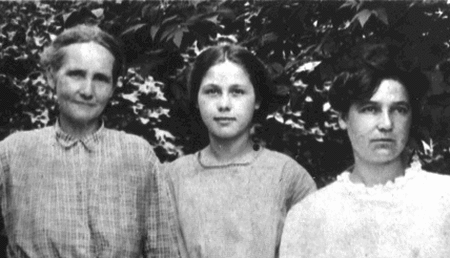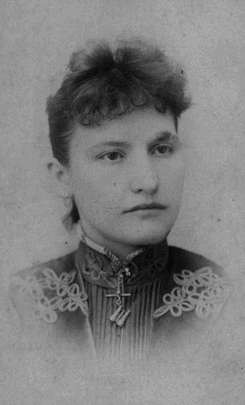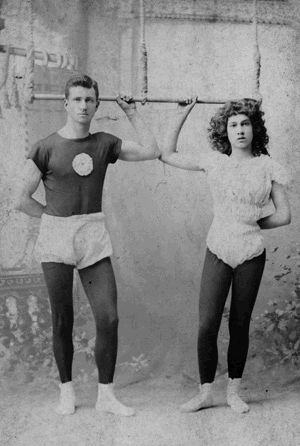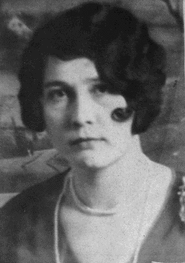Blv. Caroline High Correll
Founder of Tradition
Founder of Tradition
 Above: Caroline High Correll and her daughters Mable and Dollie, c. 1914
Above: Caroline High Correll and her daughters Mable and Dollie, c. 1914
Caroline High Correll claimed to come from a family of hereditary Witches. The family was of mixed racial ancestry and highly syncretizing in their attitudes. Although exactly what Caroline's birth family actually believed or practiced will probably never be known with certainty, what is known is that the family followed some sort of unorthodox religious practice and that they maintained a secluded compound near the Indiana/Illinois border. Caroline High was born at this compound in 1860, daughter of William and Sarah Ann High. In 1864 Caroline’s family left the compound, but not the family, to live in nearby Danville, Illinois.
 Above: Caroline High Correll, c. 1879
Above: Caroline High Correll, c. 1879
In 1876 the High family compound was destroyed by federal authorities in a Waco-style raid that left many of the High family members and their supporters dead. In subsequent months many other family members were tried, imprisoned, or executed including some of Caroline’s closest relatives. All her life Caroline maintained that the charges that led to the raid were false, and attributed them to racial and religious bigotry.
In 1879 Caroline founded a “new family” which became known as the Correllian Tradition, after her married name: Correll. Caroline claimed that this Tradition was built upon the beliefs of her birth family, but also incorporated new elements throughout her lifetime, as have her successors.
Caroline and her husband John Correll traveled widely and operated a number of businesses over the years. For many years the operated a carnival during the summer, and worked as “Art Lecturers” during the winter using what was then cutting edge technology that was as much an attraction as the art they exhibited.
In 1879 Caroline founded a “new family” which became known as the Correllian Tradition, after her married name: Correll. Caroline claimed that this Tradition was built upon the beliefs of her birth family, but also incorporated new elements throughout her lifetime, as have her successors.
Caroline and her husband John Correll traveled widely and operated a number of businesses over the years. For many years the operated a carnival during the summer, and worked as “Art Lecturers” during the winter using what was then cutting edge technology that was as much an attraction as the art they exhibited.
 Above: Dora High-Correll and her husband from a promotional photo taken to promote their trapeze act, c. 1897.
Above: Dora High-Correll and her husband from a promotional photo taken to promote their trapeze act, c. 1897.
Caroline worked as a psychic reader, and was an attraction at her own carnival.
Caroline’s eldest daughter, Dora High Correll, also was also an attraction at the carnival, performing on the high trapeze without a net. Dora’s death in 1898 brought the carnival to an end. Her parent’s marriage ended not long after.
Whatever the beliefs of Caroline’s ancestors may have been, she became involved in European Witchcraft in the early 1900s. Caroline was a close friend of, and may have been related to, the artist Lydia Becket. Becket introduced Caroline to Aradianism –an Americanized form of Italian Stregheria Witchcraft as filtered through Leland’s Aradia. Many Aradian ideas have been central to Correllianism ever since.
Caroline continued to work as a psychic reader until her death. She also performed healings, and sold herbal remedies and charms of various kinds. In addition to Correllianism, which was a private familial tradition at the time, Caroline was also prominent in the Spiritualist movement and in the Universalist movement.

Caroline regarded her lineage as being matrilineal in nature, and in her lifetime followed this fairly pattern strictly, though the Tradition departed from it under the Regent LaVeda. Caroline had three daughters who were her potential heiresses: Dora, Dollie, and Mable. Dora and Dollie each died before their mother, leaving Mable as heiress.
Caroline High Correll died in 1939, and was succeeded as Head of the High-Correll family by her daughter Mable.
Left: Mable High Correll, second Head of the Correllian Tradition (R. 1939 - 1966)
Caroline High Correll died in 1939, and was succeeded as Head of the High-Correll family by her daughter Mable.
Left: Mable High Correll, second Head of the Correllian Tradition (R. 1939 - 1966)
